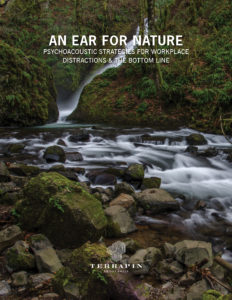

News
Terrapin Releases An Ear for Nature
Dakota Walker
Share
Humans experience the world predominantly through our sense of sight. When asked to imagine our favorite nature experience, we most often describe the visual surroundings. But imagine nature without sound; a walk through a silent forest without animal sounds and rustling breezes, or laying on a beach without whooshing waves and seagulls.
Sounds add a rich layer of detail to all of our experiences. In fact, research now shows that they are an essential component to our perception of tranquility in any given setting. However, the process of turning audio waves into discernible sound turns out to be far more selective and nuanced than we previously thought. Over time, the human brain has evolved a sophisticated method of prioritizing the sound information that matters most. Knowing how important sound is to how we perceive nature, we can leverage our connection to natural soundscapes to improve one of the more mentally demanding and distracting spaces we spend significant time in: the open-plan office.

An Ear for Nature: Psychoacoustic Strategies for Workplace Distraction & the Bottom Line looks at the complex way in which the brain perceives sound, called psychoacoustics, and how that in turn affects our cognitive performance and psychological well being. Sponsored by Plantronics, this paper explores wide-ranging research on the economic impacts of workplace noise distraction, our unique response to particular nature sounds, and innovative strategies to improving office sound environments.
This publication represents just one more facet of the ever growing body of research into the human-nature connection. It outlays actionable information that companies can use to improve productivity, employee satisfaction, and the bottom line.
Header Image courtesy of Anvesh Uppunuthula/Unsplash
Banner Image courtesy of Ganapathy Kumar/Unsplash
Dakota Walker
Dakota Walker is an Associate Project Manager & Research Analyst at Terrapin Bright Green. He recently graduated summa cum laude from the University of North Carolina Asheville with a degree in Environmental Management and Policy. Dakota believes the genius of nature has yet to be matched by human innovation. He’s interested in finding new approaches to solving contemporary policy and design challenges that reflect the resilience and resourcefulness of natural systems.
Topics
- Occupant Comfort
- Materials Science
- Speaking
- LEED
- Terrapin Team
- Phoebe
- Community Development
- Greenbuild
- Technology
- Biophilic Design Interactive
- Catie Ryan
- Spanish
- Hebrew
- French
- Portuguese
- Publications
- Carbon Neutrality
- Environmental Values
- Conference
- Psychoacoustics
- Education
- Workshop
- Mass Timber
- Transit
- Carbon Strategy
- connection with natural materials
- interior design
- inspirational hero
- biophilia
- economics of biophilia
- Sustainability
- Systems Integration
- Biophilic Design
- Commercial
- Net Zero
- Resorts & Hospitality
- Energy Utilization
- Water Management
- Corporations and Institutions
- Institutional
- Ecosystem Science
- Green Guidelines
- Profitability
- Climate Resiliency
- Health & Wellbeing
- Indoor Environmental Quality
- Building Performance
- Bioinspired Innovation
- Biodiversity
- Residential
- Master Planning
- Architects and Designers
- Developers and Building Owners
- Governments and NGOs
- Urban Design
- Product Development
- Original Research
- Manufacturing
- Industrial Ecology
- Resource Management
- Sustainability Plans
- Health Care


